Music courses & celebrity masterclasses
Review: Music Theory Online
Unveiling the Advantages of Interactive Music Theory Learning Online
In today’s fast-paced digital world, the internet has opened up endless possibilities for learning, including the realm of music theory. With the rise of online education platforms, aspiring musicians now have the opportunity to delve into the intricate world of music theory through interactive learning. The Maestro Online teaches practical online courses that cover all your theory needs, as a player, through practical courses; you learn through doing.
The Maestro Online is honoured to have been asked by MTB (Music Teachers’ Board) to review their latest interactive Music Theory Courses as well as their Music Theory Practice option. These two options support learners preparing for their Music Theory Exams. MTB is an exam board accredited by Ofqual, specialising in digital remote assessment for graded instrumental exams and music theory.
Why Study Music Theory? I Just Want to Play!
Let’s face it, we all want to play or sing, that’s why we study music. However, there’s tremendous benefit in understanding everything behind the sound.
Reading Music and Sight Reading
For instance, being able to read music fluently helps us learn a piece more quickly. It also helps us sight-read better. The MTB Grade 1 Theory really cleverly connects what you see on the notes with a piano keyboard. This course works with wonderful small steps ways: (1) from a letter name, find the note on the piano, (2) from a piano key, name the note, (3) from a note on the stave, find the piano key.
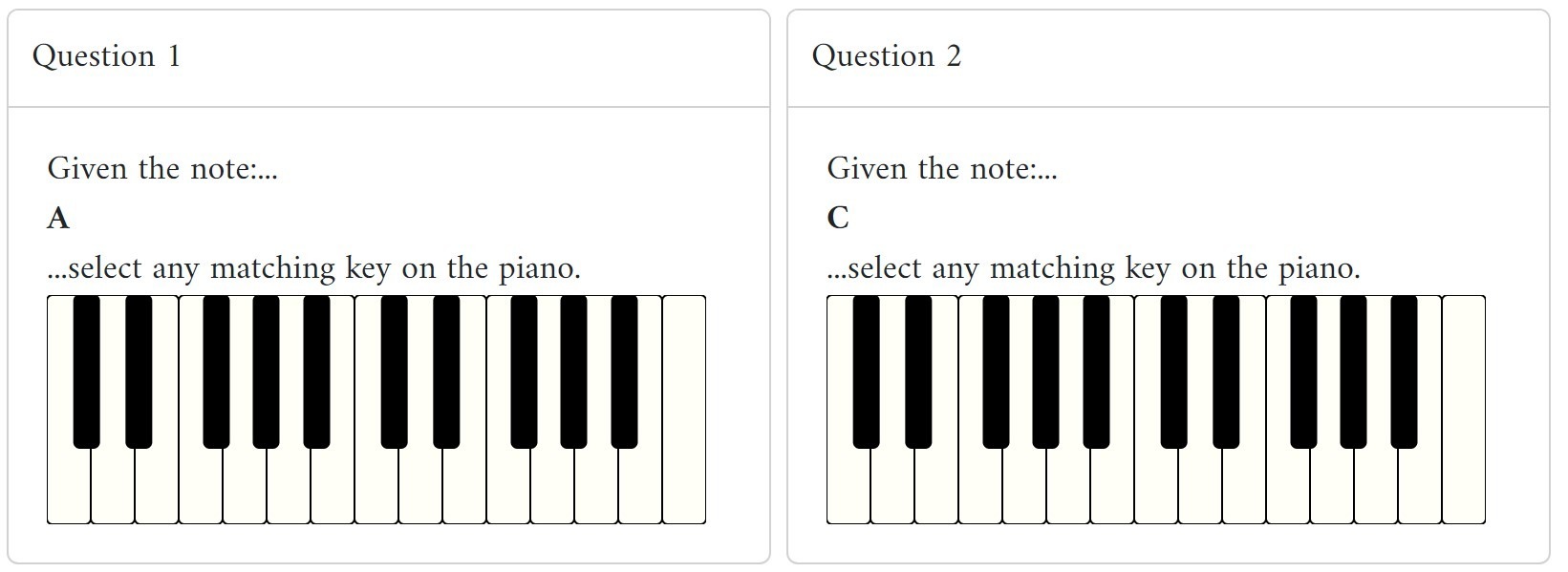
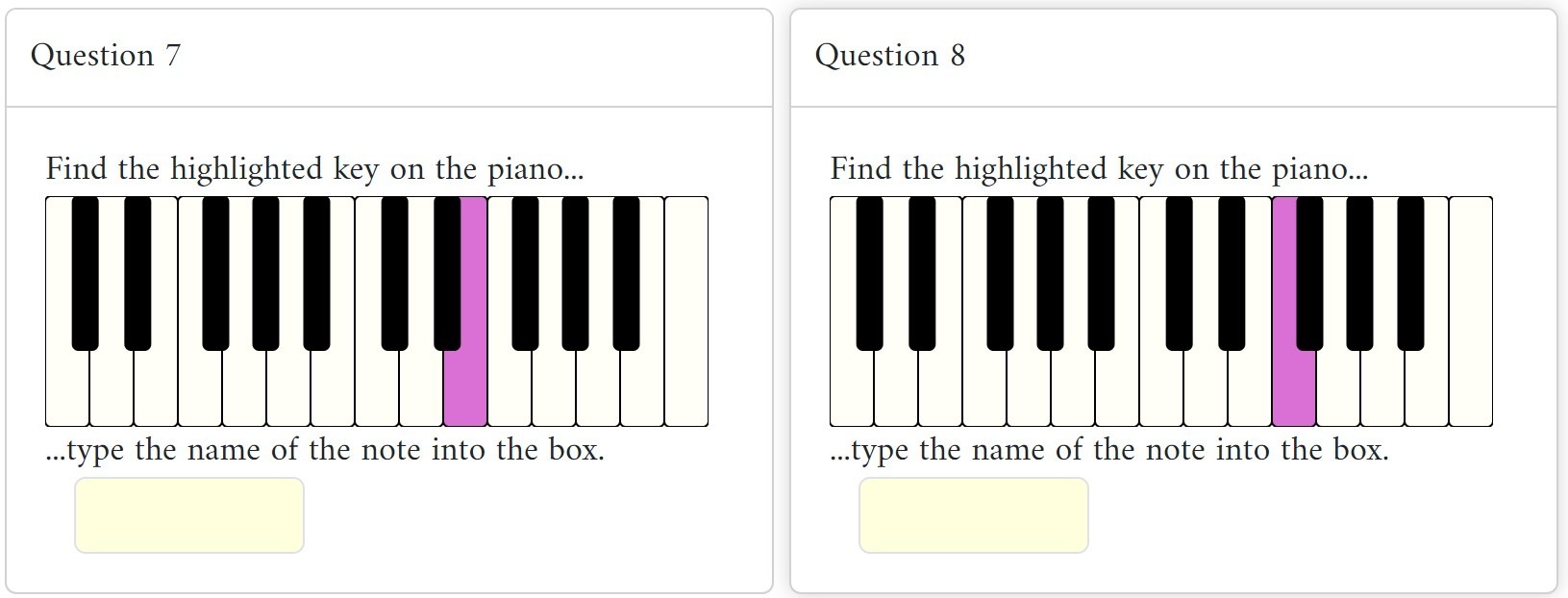
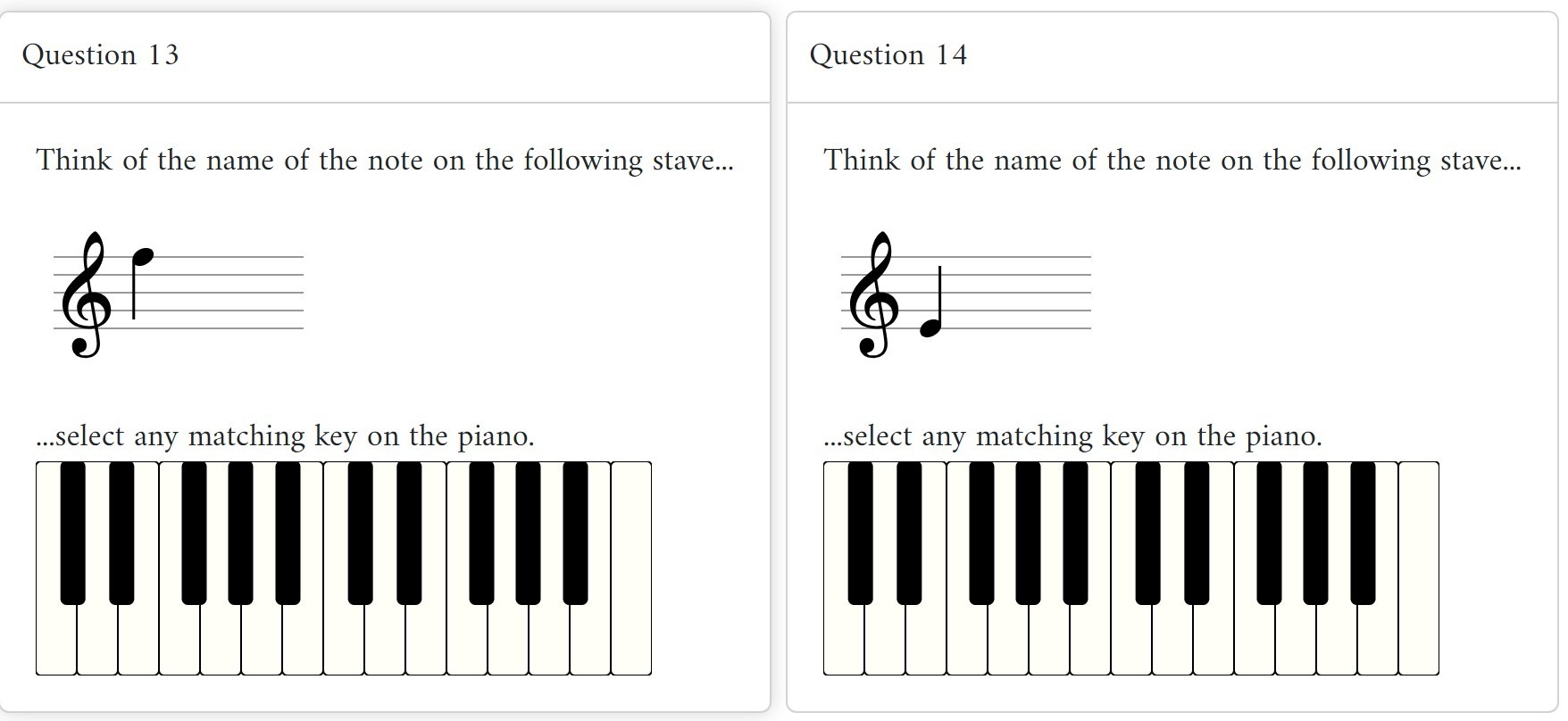
The course covers all the basics that you need including sharps and flats, time-signatures, intervals, key signatures and writing major scales.
Musical Scales
Understanding scales helps us play the correct notes too. For instance, if you know that a piece is in G Major, then your music theory teaches you that you need to play an F# rather than an F natural. Equally, when a new note arrives (for instance a C#), we can spot that the music “modulates” (changes key, in this case likely to D Major). We can then use our knowledge of the new scale to help us play the correct notes.
What I really like about the MTB Theory Grade 1 is the connection between what you see and what you hear. Traditional music theory, if taught purely from a book, turns the learner off because they don’t hear it and therefore they don’t “see the point”. Effectively theory and aural training overlap, which is exactly what you’d expect in more holistic teaching such as the Simultaneous Learning that the internationally renowned music educator, Paul Harris promotes.
The course covers all the basics that you need including sharps and flats, time-signatures, intervals, key signatures and writing major scales.

Chords and Chord Progressions
Understanding chords can help us read and memorise pieces quicker when we see familiar chord progressions. Equally, we can spot unusual chord progressions and understand why a piece sounds more special. Chord progressions can help people improvise too, as can understanding of scales.
Again, the connection between sound and notation is where online music theory is far better than in a book. Take a look at this video of me working out some major chords. The great thing is that I can check my answer and try again. This means instant feedback, which means quicker learning. No more waiting for the teacher to mark it next week and no more using up valuable lesson time whne you could be playing or singing your pieces!
Dynamics and Articulation
Dynamics (how loud or soft you play/sing as well as gradually getting louder or softer) alongside “articulation” (whether notes are short and sharp, smooth and legato, accented etc) are included. It would be brilliant if MTB could find a way to connect the sound with the notation just as in the above Grade 1 activities.
The MTB Music Theory Practice Option
MTB have a Music Theory Practice option, which is separate from their Music Theory Course and Music Theory Exam. In the practice option, you have access to unlimited practice questions, and the option to do a timed practice exam. What I really like about this option is, as for the course, you see if you’ve got the correct answer immediately. Additionally, there’s the option to switch off feedback. However, I love instant feedback! How often have you submitted homework to a teacher, had it marked, then it’s returned a week later and you’ve forgotten what you wrote?! The course allows you to try a different answer if you get it wrong, but the practice paper doesn’t.
Here you will find everything that you expect: more complex rhythms, simple and compound time, enharmonics, more intervals, more key signatures, the addition of harmonic minor scales, more on triads, transposition (yes, you can hear it to check it!), and some terms and signs to help you understand specific music technical vocabulary that might appear on your music score.
Grade 5 Music Theory Online
Grade 5 also continues developing core concepts with aural-theory, ear-eye connection. The Maestro Online is very much influenced by the famous Hungarian composer and music educator Zoltán Kodály. His philosophy was inspired by the way we naturally learn. As babies, we hear first, then copy sounds and later on we improvise and create our own sentences, finally we learn to read and write. In other words, we move from sound to symbol. Some of this connection is very evident in the MTB concept.
Melodic Dictation
The topic “Melody” moves step-by-step from spotting mistakes (comparing a written out tune with a recording) to melodic dictation (hearing a tune and having to write it down). The latter is particularly hard for many people and yet is an important element of language teaching. When I first learned to improvise my improvisation teacher told me that I should transcribe all of my favourite jazz solos. Wow! What a challenge! However, that’s how jazz musicians learn – they hear a “lick” from another player, fall in love with it, work it out, transpose it into many keys and then adapt it to make it their own whilst slipping it into their improvisations. This is where a jazz musician might say that they are “influenced” by an idol of theirs.
Melodic dictation is found in GCSE, A Level, RCO diplomas and other musical examinations across the world. Almost everybody seems to find this part of an exam extremely difficult. I would urge MTB to make bulk use of their interactive technology available to schools as students in examination classes can only benefit from more practice in this area.
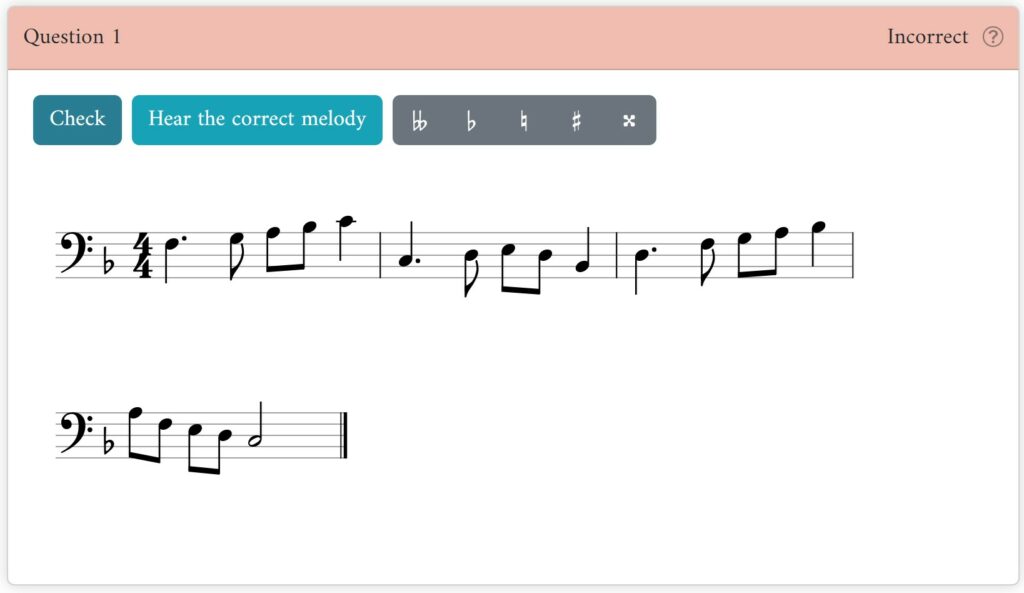
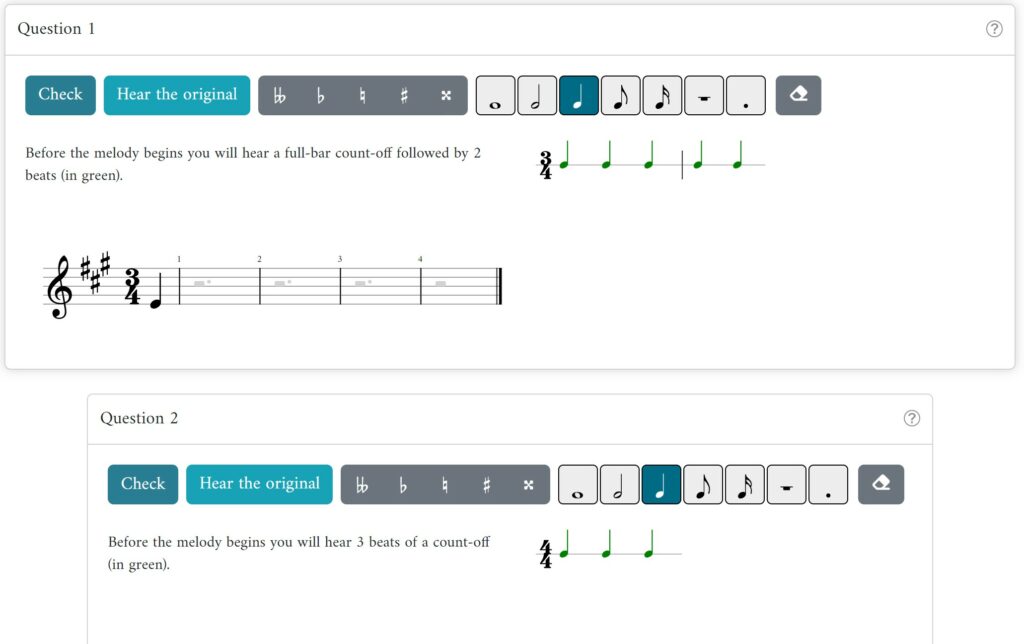
Instruments and Voices, Terms and Signs
It’s great to learn about the many instruments out there and to gain a respect for instruments that we don’t play, but our friends might. All of this is included in Grade 5. I wonder if MTB could, in the future, add some more sound files so that learners can identify the instruments by ear too? For instance, not many people have a friend who plays the oboe and so the sound can be quite unfamiliar.
Conclusion – Why You Should Learn Music Theory Online with MTB
- Convenient Learning at Your Fingertips: Gone are the days when you had to travel to attend music theory classes. With interactive music theory learning online, knowledge is just a click away. Whether you’re at home, in a coffee shop, or travelling, all you need is an internet connection to access comprehensive music theory lessons. This convenience allows you to learn at your own pace, fitting your studies seamlessly into your busy lifestyle.
- Interactive and Engaging Lessons: Interactive music theory learning online offers engaging lessons that go beyond the confines of traditional textbooks. Through the connection between the visual notation and the auditory sound, complex music theory concepts come to life.
- More Rapid Learning and Progress: The ability to immediately discover if you are right or wrong and correct your answer leads to much more rapid progress and learning. No need to wait for your next lesson and forget why you put what you put in the first place!
Affordability and Allowing You to Make Music!: It’s much more financially viable to spend your money on interactive music theory software than to use your lesson time. Furthermore, you can now use your lesson time to really enjoy making music on your instrument or voice!
In conclusion, interactive music theory learning online, particularly on platforms like MTB, offers a wealth of advantages. From convenience and interactivity to personalized learning experiences and expert guidance, these platforms empower musicians of all levels to deepen their understanding of music theory. Embrace the digital harmony of learning and embark on your musical journey today. With interactive music theory learning online, the world of melodies and harmonies awaits, just a click away.
Interactive Music Theory
Why not visit MTB and re-invent your entire Music Theory experience
Celebrity Masterclasses
Interactive Music Improvisation Courses and Masterclasses
Subscribe Today
For 1-1 music lessons (Zoom or in-person) visit The Maestro Online Calendar
Additional Membership Benefits
- Zoom support (there’s a human you can interactive with behind this platform!)
Additional Membership Benefits
- 3 months free membership of the Arts & Cultural Network (worth £45).
Additional Membership Benefits
- 1 months free UK piano hire and free delivery from Musiq Group with a 12 month contract.
Additional Membership Benefits
- You are also supporting The Maestro Online charitable outreach – bringing music education to regions and countries where such resources are difficult to find.
All Courses
Far cheaper than 1-1 lessons + a great add-on-
Annual: £195.99
-
All Piano Courses
-
All Organ Courses
-
All Singing Courses
-
All Guitar Courses
All Courses + Masterclasses + Exam Practice Toolkits
Best value-
Over £2000 total value
-
Annual: £299.99
-
All Masterclasses
-
All Exam Practice Toolkits
-
All Piano Courses
-
All Organ Courses
-
All Singing Courses
-
All Guitar Courses
All Courses + Masterclasses Exam Practice Toolkits
+ 1 hour 1-1 Lesson-
Monthly 1hr Lesson
-
All Exam Practice Toolkits
-
All Masterclasses
-
All Piano Courses
-
All Organ Courses
-
All Singing Courses
-
All Guitar Courses



